Freehold (732) 294-9393
Freehold (732) 294-9393

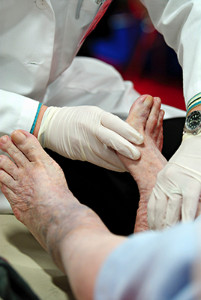 Falls and their effects on the elderly are, unfortunately, not reported on enough. This lack of reporting prevents overall awareness and the spread of knowledge in how to prevent them. Fortunately this has been changing in the past several years, with 2008 marking the first year that Falls Prevention Awareness Day was held by the National Council on Aging (NCOA). Despite this, awareness of the issue has a long way to go. Here are some facts about falls and falls prevention. Those who are age 65 or older and who have been to the emergency department are unlikely to engage in falls-prevention programs once discharged. While it has been reported that regular strength and flexibility programs for the elderly help prevent falls, some practices like Tai Chi have been found to help as well. Finally, elderly persons who have a history of falls, have suffered from a previous fracture, and have a body mass index (BMI) of 20 kg/m² are more likely to suffer another fracture.
Falls and their effects on the elderly are, unfortunately, not reported on enough. This lack of reporting prevents overall awareness and the spread of knowledge in how to prevent them. Fortunately this has been changing in the past several years, with 2008 marking the first year that Falls Prevention Awareness Day was held by the National Council on Aging (NCOA). Despite this, awareness of the issue has a long way to go. Here are some facts about falls and falls prevention. Those who are age 65 or older and who have been to the emergency department are unlikely to engage in falls-prevention programs once discharged. While it has been reported that regular strength and flexibility programs for the elderly help prevent falls, some practices like Tai Chi have been found to help as well. Finally, elderly persons who have a history of falls, have suffered from a previous fracture, and have a body mass index (BMI) of 20 kg/m² are more likely to suffer another fracture.
Preventing falls among the elderly is very important. If you are older and have fallen or fear that you are prone to falling, consult with Dr. Henry Miller from New Jersey. Our doctor will assess your condition and provide you with quality advice and care.
Every 11 seconds, an elderly American is being treated in an emergency room for a fall related injury. Falls are the leading cause of head and hip injuries for those 65 and older. Due to decreases in strength, balance, senses, and lack of awareness, elderly persons are very susceptible to falling. Thankfully, there are a number of things older persons can do to prevent falls.
How to Prevent Falls
Some effective methods that older persons can do to prevent falls include:
Falling can be a traumatic and embarrassing experience for elderly persons; this can make them less willing to leave the house, and less willing to talk to someone about their fears of falling. Doing such things, however, will increase the likelihood of tripping or losing one’s balance. Knowing the causes of falling and how to prevent them is the best way to mitigate the risk of serious injury.
If you have any questions, please feel free to contact our office located in Freehold, NJ . We offer the newest diagnostic and treatment technologies for all your foot care needs.
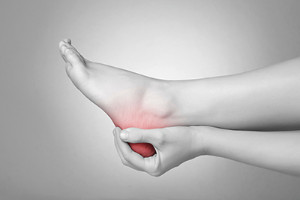 Plantar fasciitis, one of the most common causes of heel pain, is a condition that many people suffer from. Among those who do are runners and athletes, those who are overweight, and people who have to stand for extended periods of time. While not life-threatening, it can cause substantial pain and discomfort to those who experience it. Thankfully, there are some things that you can do to help alleviate the pain. First, rest your feet and avoid overexerting them in any strenuous activities that may have led to the heel pain. Second, ice your feet and use anti-inflammatory medications prescribed or recommended by a podiatrist. Some podiatrists may suggest some form of relatively light physical therapy to strengthen the feet, however this is not always recommended. Maintaining a healthy weight can also reduce the stress on the feet that could have led to heel pain. Finally, be sure to wear comfortable shoes that have good cushioning and support.
Plantar fasciitis, one of the most common causes of heel pain, is a condition that many people suffer from. Among those who do are runners and athletes, those who are overweight, and people who have to stand for extended periods of time. While not life-threatening, it can cause substantial pain and discomfort to those who experience it. Thankfully, there are some things that you can do to help alleviate the pain. First, rest your feet and avoid overexerting them in any strenuous activities that may have led to the heel pain. Second, ice your feet and use anti-inflammatory medications prescribed or recommended by a podiatrist. Some podiatrists may suggest some form of relatively light physical therapy to strengthen the feet, however this is not always recommended. Maintaining a healthy weight can also reduce the stress on the feet that could have led to heel pain. Finally, be sure to wear comfortable shoes that have good cushioning and support.
Many people suffer from bouts of heel pain. For more information, contact Dr. Henry Miller of New Jersey. Our doctor can provide the care you need to keep you pain-free and on your feet.
Causes of Heel Pain
Heel pain is often associated with plantar fasciitis. The plantar fascia is a band of tissues that extends along the bottom of the foot. A rip or tear in this ligament can cause inflammation of the tissue.
Achilles tendonitis is another cause of heel pain. Inflammation of the Achilles tendon will cause pain from fractures and muscle tearing. Lack of flexibility is also another symptom.
Heel spurs are another cause of pain. When the tissues of the plantar fascia undergo a great deal of stress, it can lead to ligament separation from the heel bone, causing heel spurs.
Why Might Heel Pain Occur?
Treatments
Heel pain should be treated as soon as possible for immediate results. Keeping your feet in a stress-free environment will help. If you suffer from Achilles tendonitis or plantar fasciitis, applying ice will reduce the swelling. Stretching before an exercise like running will help the muscles. Using all these tips will help make heel pain a condition of the past.
If you have any questions please contact our office located in Freehold, NJ . We offer the newest diagnostic and treatment technologies for all your foot and ankle needs.
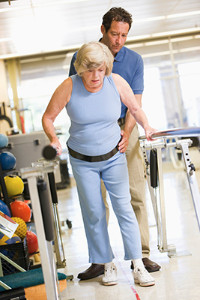 Compared to younger athletes, elderly athletes are more likely to suffer a foot injury as they get older. Foot conditions and injuries that affect all ages include plantar fasciitis, ankle sprains, stress fractures, and Morton’s neuroma. While the sport one plays can vary, there are certain things that athletes of all ages can do to prevent foot injuries. Wearing an ankle brace can help prevent sprains, while quality footwear can prevent foot pain. Proper arch support can be the difference between comfort and discomfort. Custom orthotics may be necessary for some people who have flat or unsupported feet. Stretching is vital, and everyone should stretch not only before an activity but after as well. Finally, keeping your feet dry by changing socks and using foot powder can prevent conditions like athlete’s foot. If you are an elderly athlete, be sure to see a podiatrist to see if certain activities are right for you.
Compared to younger athletes, elderly athletes are more likely to suffer a foot injury as they get older. Foot conditions and injuries that affect all ages include plantar fasciitis, ankle sprains, stress fractures, and Morton’s neuroma. While the sport one plays can vary, there are certain things that athletes of all ages can do to prevent foot injuries. Wearing an ankle brace can help prevent sprains, while quality footwear can prevent foot pain. Proper arch support can be the difference between comfort and discomfort. Custom orthotics may be necessary for some people who have flat or unsupported feet. Stretching is vital, and everyone should stretch not only before an activity but after as well. Finally, keeping your feet dry by changing socks and using foot powder can prevent conditions like athlete’s foot. If you are an elderly athlete, be sure to see a podiatrist to see if certain activities are right for you.
Proper foot care is something many older adults forget to consider. If you have any concerns about your feet and ankles, contact Dr. Henry Miller from New Jersey. Our doctor can provide the care you need to keep you pain-free and on your feet.
The Elderly and Their Feet
As we age we start to notice many changes in our body, but the elder population may not notice them right away. Medical conditions may prevent the elderly to take notice of their foot health right away. Poor vision is a lead contributor to not taking action for the elderly.
Common Conditions
Susceptible Infections
Diabetes and poor circulation can cause general loss of sensitivity over the years, turning a simple cut into a serious issue.
If you have any questions please feel free to contact our office located in Freehold, NJ . We offer the newest diagnostic and treatment technologies for all your foot and ankle needs.
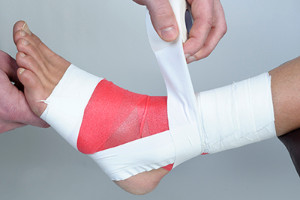 Philadelphia Phillies center fielder, Pedro Florimon, recently dislocated his right ankle during a game against the Miami Marlins. Florimon had to be taken off the field on a cart. The injury was severe enough to unfortunately end the rest of the season for him. This was Florimon’s first year with the Phillies, and he had been playing well with a batting average of .348. The Phillies already have two outfielders disabled, and the loss of Florimon will temporarily strain them.
Philadelphia Phillies center fielder, Pedro Florimon, recently dislocated his right ankle during a game against the Miami Marlins. Florimon had to be taken off the field on a cart. The injury was severe enough to unfortunately end the rest of the season for him. This was Florimon’s first year with the Phillies, and he had been playing well with a batting average of .348. The Phillies already have two outfielders disabled, and the loss of Florimon will temporarily strain them.
Sports related foot and ankle injuries require proper treatment before players can go back to their regular routines. For more information, contact Dr. Henry Miller of New Jersey. Our doctor can provide the care you need to keep you pain-free and on your feet.
Sports Related Foot and Ankle Injuries
Foot and ankle injuries are a common occurrence when it comes to athletes of any sport. While many athletes dismiss the initial aches and pains, the truth is that ignoring potential foot and ankle injuries can lead to serious problems. As athletes continue to place pressure and strain the area further, a mild injury can turn into something as serious as a rupture and may lead to a permanent disability. There are many factors that contribute to sports related foot and ankle injuries, which include failure to warm up properly, not providing support or wearing bad footwear. Common injuries and conditions athletes face, including:
Sports related injuries are commonly treated using the RICE method. This includes rest, applying ice to the injured area, compression and elevating the ankle. More serious sprains and injuries may require surgery, which could include arthroscopic and reconstructive surgery. Rehabilitation and therapy may also be required in order to get any recovering athlete to become fully functional again. Any unusual aches and pains an athlete sustains must be evaluated by a licensed, reputable medical professional.
If you have any questions please feel free to contact our office located in Freehold, NJ . We offer the newest diagnostic and treatment technologies for all your foot and ankle needs.
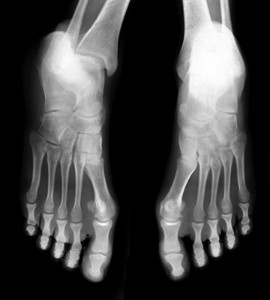 Researchers from South Korea have discovered a new method to predict if bunions will reemerge after surgery. The team utilized X-ray imaging and identified reemergence as a hallux valgus angle (HVA) of 20 degrees or more. Using this information, the team was able to predict the recurrence of bunions. Recurrence was more likely if the postoperative HVA was eight degrees or more. An HVA of 40 degrees or more also increased the likelihood of reemergence after surgery. The researchers are hopeful that more research will confirm the data, as this could help future surgeries and patients.
Researchers from South Korea have discovered a new method to predict if bunions will reemerge after surgery. The team utilized X-ray imaging and identified reemergence as a hallux valgus angle (HVA) of 20 degrees or more. Using this information, the team was able to predict the recurrence of bunions. Recurrence was more likely if the postoperative HVA was eight degrees or more. An HVA of 40 degrees or more also increased the likelihood of reemergence after surgery. The researchers are hopeful that more research will confirm the data, as this could help future surgeries and patients.
If you are suffering from bunions, contact Dr. Henry Miller of New Jersey. Our doctor can provide the care you need to keep you pain-free and on your feet.
What Is a Bunion?
A bunion is formed of swollen tissue or an enlargement of boney growth, usually located at the base joint of the toe that connects to the foot. The swelling occurs due to the bones in the big toe shifting inward, which impacts the other toes of the foot. This causes the area around the base of the big toe to become inflamed and painful.
Why Do Bunions Form?
Genetics – Susceptibility to bunions are often hereditary
Stress on the feet – Poorly fitted and uncomfortable footwear that places stress on feet, such as heels, can worsen existing bunions
How Are Bunions Diagnosed?
Doctors often perform two tests – blood tests and x-rays – when trying to diagnose bunions, especially in the early stages of development. Blood tests help determine if the foot pain is being caused by something else, such as arthritis, while x-rays provide a clear picture of your bone structure to your doctor.
How Are Bunions Treated?
If you have any questions, please feel free to contact our office located in Freehold, NJ . We offer the newest diagnostic and treatment technologies for all your foot care needs.
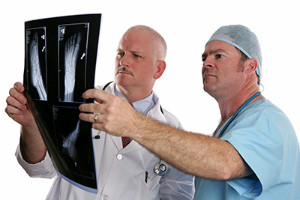 Green Bay Packers’ defensive lineman Montravius Adams’ season is now “in jeopardy” after suffering a stress fracture. According to Ian Rapoport of the NFL Network, Adams is expected to have a screw inserted into his foot due to the injury. As a result of the fracture, the defensive lineman will miss “multiple weeks” of gameplay. Regarding the injury, Packers coach Mike McCarthy said, “I don’t think it’s time for concern,” and added, “It’s the unfortunate part of our game.”
Green Bay Packers’ defensive lineman Montravius Adams’ season is now “in jeopardy” after suffering a stress fracture. According to Ian Rapoport of the NFL Network, Adams is expected to have a screw inserted into his foot due to the injury. As a result of the fracture, the defensive lineman will miss “multiple weeks” of gameplay. Regarding the injury, Packers coach Mike McCarthy said, “I don’t think it’s time for concern,” and added, “It’s the unfortunate part of our game.”
Activities where too much pressure is put on the feet can cause stress fractures. To learn more, contact Dr. Henry Miller from New Jersey. Our doctor can provide the care you need to keep your pain free and on your feet.
Dealing with Stress Fractures of the Foot and Ankle
Stress fractures occur in the foot and ankle when muscles in these areas weaken from too much or too little use. The feet and ankles then lose support when walking or running from the impact of the ground. Since there is no protection, the bones receive the full impact of each step. Stress on the feet can cause cracks to form in the bones, thus creating stress fractures.
What Are Stress Fractures?
Stress fractures occur frequently in individuals whose daily activities cause great impact on the feet and ankles. Stress factors are most common among:
Symptoms
Pain from the fractures occur in the area of the fractures and can be constant or intermittent. It will often cause sharp or dull pain with swelling and tenderness. Engaging in any kind of activity which involves high impact will aggravate pain.
If you have any questions please feel free to contact our office located in Freehold, NJ . We offer the newest diagnostic and treatment technologies for all your foot and ankle needs.
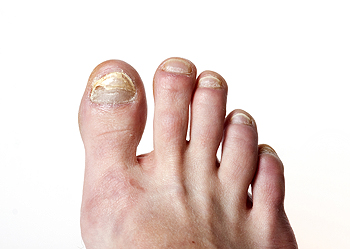 Toenail fungus is a condition that affects approximately 14% of the population. Fungi can be found almost anywhere in our environment, and it is important that you are aware of the different ways you can avoid them. One of the best ways you can prevent toenail fungus is by wearing socks. Some of the best sock fabrics in terms of protecting your feet are nylon, wool, and polypropylene. Another tip is to avoid walking around in wet areas as much as possible, since fungi tend to thrive in moist environments. Anti-fungal powder has also been proven to be beneficial in fighting fungus. The powder works by weakening the cell membrane of the fungus and preventing it from producing ergosterol, an essential part of its structure.
Toenail fungus is a condition that affects approximately 14% of the population. Fungi can be found almost anywhere in our environment, and it is important that you are aware of the different ways you can avoid them. One of the best ways you can prevent toenail fungus is by wearing socks. Some of the best sock fabrics in terms of protecting your feet are nylon, wool, and polypropylene. Another tip is to avoid walking around in wet areas as much as possible, since fungi tend to thrive in moist environments. Anti-fungal powder has also been proven to be beneficial in fighting fungus. The powder works by weakening the cell membrane of the fungus and preventing it from producing ergosterol, an essential part of its structure.
For more information about treatment, contact Dr. Henry Miller of New Jersey. Our doctor can provide the care you need to keep you pain-free and on your feet.
Toenail Fungus Treatment
Toenail fungus is a condition that affects many people and can be especially hard to get rid of. Fortunately, there are several methods to go about treating and avoiding it.
Antifungals & Deterrence
Oral antifungal medicine has been shown to be effective in many cases. It is important to consult with a podiatrist to determine the proper regiment for you, or potentially explore other options.
Applying foot powder on the feet and shoes helps keep the feet free of moisture and sweat.
Sandals or open toed shoes – Wearing these will allow air movement and help keep feet dry. They also expose your feet to light, which fungus cannot tolerate. Socks with moisture wicking material also help as well.
If you have any questions please feel free to contact our office located in Freehold, NJ . We offer the newest diagnostic tools and technology to treat your foot and ankle needs.
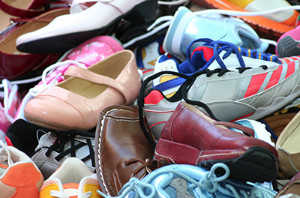 The health of your feet is very important, and it is crucial that you are aware of what may be harming them so that you can avoid any serious conditions. A good tip to follow while shopping for shoes is to look for shoes made of leather material. Unlike other artificial materials, leather is a natural fiber that allows the feet to breathe. In addition, you should look for a shoe that offers a good amount of arch support for your feet in order to prevent long-term pain and damage. Another tip is to never wear the same shoes two days in a row. When you repeatedly wear a pair of shoes, you are putting a significant amount of pressure on the same area of your foot, which can cause misalignment.
The health of your feet is very important, and it is crucial that you are aware of what may be harming them so that you can avoid any serious conditions. A good tip to follow while shopping for shoes is to look for shoes made of leather material. Unlike other artificial materials, leather is a natural fiber that allows the feet to breathe. In addition, you should look for a shoe that offers a good amount of arch support for your feet in order to prevent long-term pain and damage. Another tip is to never wear the same shoes two days in a row. When you repeatedly wear a pair of shoes, you are putting a significant amount of pressure on the same area of your foot, which can cause misalignment.
Everyday foot care is very important to prevent infection and other foot ailments. If you need your feet checked, contact Dr. Henry Miller from New Jersey. Our doctor can provide the care you need to keep you pain-free and on your feet.
Everyday Foot Care
Often, people take care of their bodies, face and hair more so than they do for their feet. But the feet are a very important aspect of our bodies, and one that we should pay more attention to. Without our feet, we would not be able to perform most daily tasks.
It is best to check your feet regularly to make sure there are no new bruises or cuts that you may not have noticed before. For dry feet, moisturizer can easily be a remedy and can be applied as often as necessary to the affected areas. Wearing shoes that fit well can also help you maintain good foot health, as well as making it easier to walk and do daily activities without the stress or pain of ill-fitting shoes, high heels, or even flip flops. Wearing clean socks with closed shoes is important to ensure that sweat and bacteria do not accumulate within the shoe. Clean socks help to prevent Athlete’s foot, fungi problems, bad odors, and can absorb sweat.
If you have any questions please feel free to contact our office located in Freehold, NJ . We offer the newest diagnostic and treatment technologies for all your foot and ankle needs.
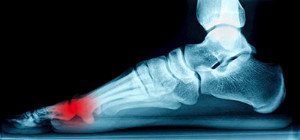 Sesamoiditis is a condition that involves inflammation of the sesamoid bones in the feet. People who partake in physical activities that put stress on the toe-end of the foot are at a higher risk of developing sesamoiditis. The condition may also be caused by wearing improper footwear like high heels. The primary symptoms of sesamoiditis are pain and inflammation in the feet, and there usually aren’t any visual signs of the condition. Physical therapy is usually the first step in the route to treating sesamoiditis, and it is important that the patient does not put their feet under a lot of stress during the process.
Sesamoiditis is a condition that involves inflammation of the sesamoid bones in the feet. People who partake in physical activities that put stress on the toe-end of the foot are at a higher risk of developing sesamoiditis. The condition may also be caused by wearing improper footwear like high heels. The primary symptoms of sesamoiditis are pain and inflammation in the feet, and there usually aren’t any visual signs of the condition. Physical therapy is usually the first step in the route to treating sesamoiditis, and it is important that the patient does not put their feet under a lot of stress during the process.
Sesamoiditis is an unpleasant foot condition characterized by pain in the balls of the feet. If you think you’re struggling with sesamoiditis, contact Dr. Henry Miller of New Jersey. Our doctor will treat your condition thoroughly and effectively.
Sesamoiditis
Sesamoiditis is a condition of the foot that affects the ball of the foot. It is more common in younger people than it is in older people. It can also occur with people who have begun a new exercise program, since their bodies are adjusting to the new physical regimen. Pain may also be caused by the inflammation of tendons surrounding the bones. It is important to seek treatment in its early stages because if you ignore the pain, this condition can lead to more serious problems such as severe irritation and bone fractures.
Causes of Sesamoiditis
Treatment for sesamoiditis is non-invasive and simple. Doctors may recommend a strict rest period where the patient forgoes most physical activity. This will help give the patient time to heal their feet through limited activity. For serious cases, it is best to speak with your doctor to determine a treatment option that will help your specific needs.
If you have any questions please feel free to contact our office located in Freehold, NJ . We offer the newest diagnostic and treatment technologies for all your foot and ankle needs.
 Morton’s neuroma occurs when there is a thickening of the tissue around the nerves leading to your toes. The pain associated with it is most commonly found between the third and fourth toes, but it can also be felt near the ball of the foot, or between the second and third toe. Causes of pain may be due to wearing shoes that are too tight such as high heels. Compared to others, people with bunions, hammertoes, and high foot arches may have a higher risk of developing Morton’s neuroma. If you suspect that you may have Morton’s neuroma it is important that you seek the assistance of a podiatrist right away in order to receive treatment.
Morton’s neuroma occurs when there is a thickening of the tissue around the nerves leading to your toes. The pain associated with it is most commonly found between the third and fourth toes, but it can also be felt near the ball of the foot, or between the second and third toe. Causes of pain may be due to wearing shoes that are too tight such as high heels. Compared to others, people with bunions, hammertoes, and high foot arches may have a higher risk of developing Morton’s neuroma. If you suspect that you may have Morton’s neuroma it is important that you seek the assistance of a podiatrist right away in order to receive treatment.
Morton’s neuroma is a very uncomfortable condition to live with. If you think you have Morton’s neuroma, contact Dr. Henry Miller of New Jersey. Our doctor will attend to all of your foot care needs and answer any of your related questions.
Morton’s Neuroma
Morton's neuroma is a painful foot condition that commonly affects the areas between the second and third or third and fourth toe, although other areas of the foot are also susceptible. Morton’s neuroma is caused by an inflamed nerve in the foot that is being squeezed and aggravated by surrounding bones.
What Increases the Chances of Having Morton’s Neuroma?
Morton’s neuroma is a very treatable condition. Orthotics and shoe inserts can often be used to alleviate the pain on the forefront of the feet. In more severe cases, corticosteroids can also be prescribed. In order to figure out the best treatment for your neuroma, it’s recommended to seek the care of a podiatrist who can diagnose your condition and provide different treatment options.
If you have any questions, please feel free to contact our office located in Freehold, NJ . We offer the newest diagnostic and treatment technologies for all your foot care needs.